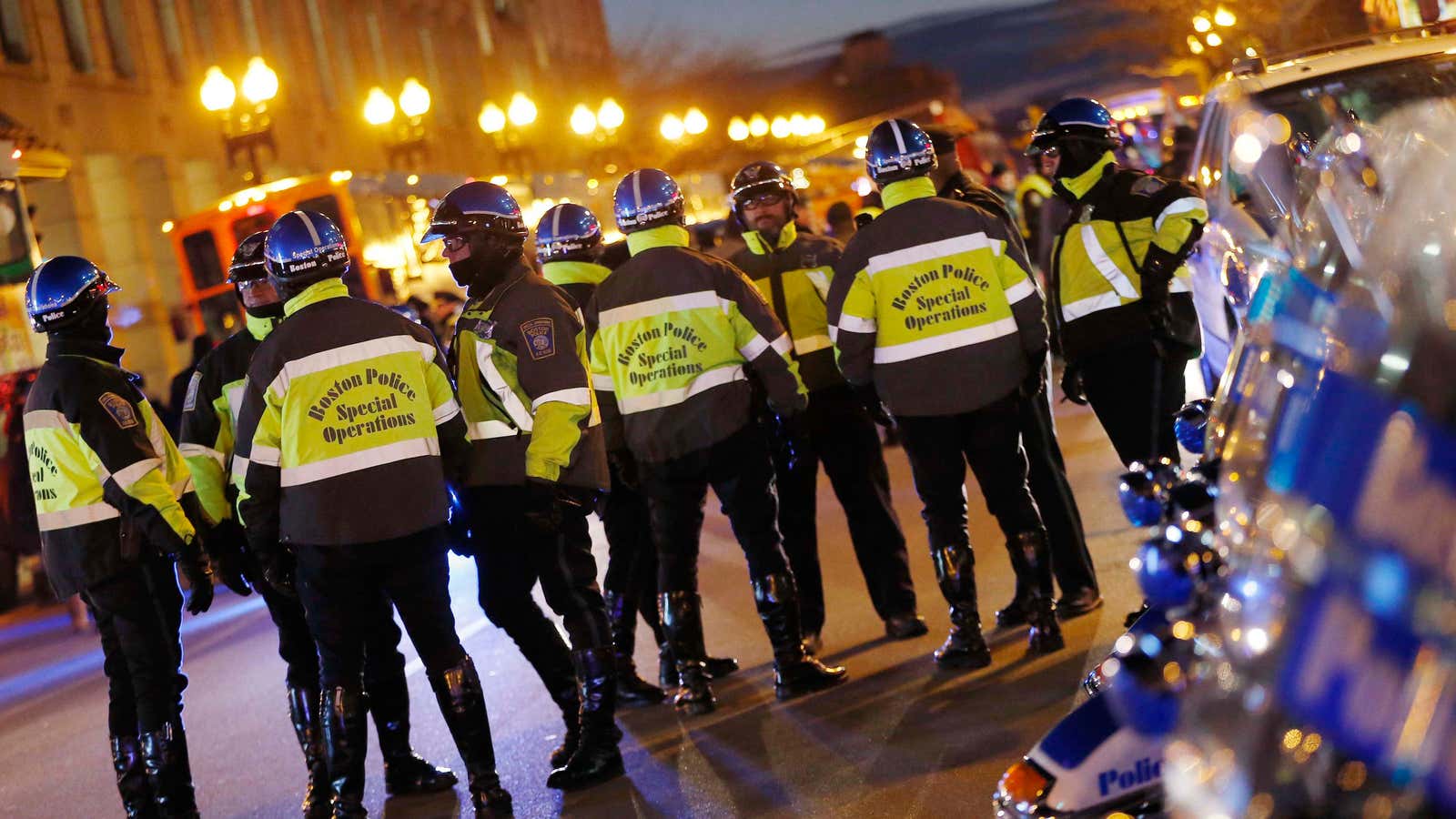On Sept. 20, the Massachusetts Supreme Judicial Court overturned the flawed conviction of Jimmy Warren.
Warren, who is black, had been arrested by Boston police in 2011. Police searching for clues about a local burglary asked Warren, who vaguely resembled one of the suspect’s descriptions, to stop. Instead, Warren ran. When police finally caught up with him, they did not find any stolen items, but they did find a gun nearby, and he was eventually charged with unlawful possession of a firearm.
A black man being wrongfully criminalized is not remarkable; it seems a daily occurrence in America. What is remarkable about this ruling is the Massachusetts Supreme Judicial Court’s explanation: that the police had no justifiable cause to stop Warren. Being a black man is, the court maintained, too vague a motive for arrest: “It was simply not possible for the police reasonably and rationally to target the defendant or any other black male wearing dark clothing as a suspect in the crime,” they said.
The court also noted that the police had no justifiable cause to arrest Warren for running away from them in the first place. In other words, it was within Warren’s legal rights to run from the police and, furthermore, the act of running away from the police does not imply guilt and is not grounds for arrest. The court cited precedent, including a 1996 ruling in which it determined, “Neither evasive behavior, proximity to a crime scene, nor matching a general description is alone sufficient to support… reasonable suspicion.”
Perhaps most remarkable of all, the court—quoting racial-profiling statistics—noted that black men were “disproportionately targeted” to the extent that flight from police should not necessarily be an admission of guilt. Rather, black men, who “in Boston are disproportionately and repeatedly targeted for FIO encounters,” the court declared, have “reason for flight totally unrelated to consciousness of guilt.”
To quote this section of the ruling in full:
We do not eliminate flight as a factor in the reasonable suspicion analysis whenever a black male is the subject of an investigatory stop. However, in such circumstances, flight is not necessarily probative of a suspect’s state of mind or consciousness of guilt. Rather, the finding that black males in Boston are disproportionately and repeatedly targeted for FIO [Field Interrogation and Observation] encounters suggests a reason for flight totally unrelated to consciousness of guilt. Such an individual, when approached by the police, might just as easily be motivated by the desire to avoid the recurring indignity of being racially profiled as by the desire to hide criminal activity. Given this reality for black males in the city of Boston, a judge should, in appropriate cases, consider the report’s findings in weighing flight as a factor in the reasonable suspicion calculus.
The court’s rationale both recognizes systemic racism and recognizes the psychological trauma created by systemic racism on the black community. Due in part to the lingering effects of this historical trauma, many black Americans remain incredibly wary of law enforcement. But now, according to the Massachusetts Supreme Judicial Court, Warren’s flight and the flight of men and women like him are potentially justifiable given the history of racism in America—specifically of police-state violence against the black community.
This is truly momentous. The court’s ruling gives both authority and credence to the argument that systemic racism is real, the unfair and disproportionate criminalization of black people is real, and the physical and emotional trauma resulting from this racism is real. The criminal justice system, this ruling suggests, is broken. But it also can acknowledge and exact justice.
“The state’s highest court, in talking about people of color, is saying that their lives matter and, under the law, their views matter,” Matthew Segal, the legal director of the ACLU of Massachusetts, told WBUR in an interview. ”The reason that’s significant is that all the time in police-civilian encounters there are disputes about what is suspicious and what is not suspicious. So this is an opinion that looks at those encounters through the eyes of a black man who might justifiably be concerned that he will be the victim of profiling.”
What will the reach of this ruling be? The promise of the ruling is undeniably tempered when we consider any potential immediate ramifications. This ruling will clearly not instantaneously translate into social change. Yes, Warren should now be able to return to his free life. But is he really free? Black lives exist in jeopardy, and black Americans’ freedom is precarious. According to the Guardian’s The Counted project, 790 people have been killed by American police so far in 2016; 194 of those people are black. Keith Lamont Scott was shot and killed by police in North Carolina on the same day as the Warren verdict. “Scott,” according to Alan Pyke at ThinkProgress, “is at least the 16th black American to die in an interaction with police in the past four weeks.”
Black Americans should not have to rely on the courts for exoneration because of their unjust criminalization. Justice needs to start outside of the courtroom. It demands a radical re-imagination of the police state in America, because one of the biggest threats to black lives in America right now is the police. And the promise of justice in the court room means nothing if you’re lying dead in a pool of blood on the street.
